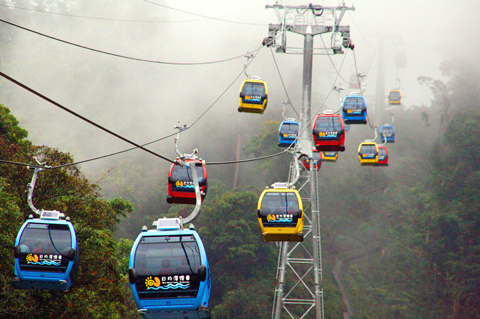A cable car system linking Sun Moon Lake and the Formosan Aboriginal Culture Village amusement park in Nantou County opened to the public yesterday, although its “official” opening is more than three months away.
The 1.87km system takes seven to 10 minutes between the two sites, which are 10km apart by road, the park administration said.
The system linking the lake’s Ita Shao Dock and the park is expected to promote local tourism because it will give visitors a bird’s eye view of the scenic lake area and the Puli basin, the park administration said.

PHOTO: CNA
The cable car system was constructed over 18 months by the park under a build-own-operate model. It passed Nantou County Government inspections on Thursday.
The park is offering residents of Yuchih Township (魚池) with free cable car rides and admission through Sunday.
Before the system’s official opening on March 31, tickets will be NT$250, while groups of more than 20 will pay NT$225 per head.
After March 31, tickets will be NT$300, concessionary prices for students and others will be NT$250 and group tickets will be NT$270.
The system will operate from 10:30am to 4pm on weekdays and until 5pm on holidays and weekends.
The 86-car system will be able to transport up to 3,000 passengers per hour, the park administration said.

Nipah virus infection is to be officially listed as a category 5 notifiable infectious disease in Taiwan in March, while clinical treatment guidelines are being formulated, the Centers for Disease Control (CDC) said yesterday. With Nipah infections being reported in other countries and considering its relatively high fatality rate, the centers on Jan. 16 announced that it would be listed as a notifiable infectious disease to bolster the nation’s systematic early warning system and increase public awareness, the CDC said. Bangladesh reported four fatal cases last year in separate districts, with three linked to raw date palm sap consumption, CDC Epidemic Intelligence

Two Taiwanese prosecutors were questioned by Chinese security personnel at their hotel during a trip to China’s Henan Province this month, the Mainland Affairs Council (MAC) said yesterday. The officers had personal information on the prosecutors, including “when they were assigned to their posts, their work locations and job titles,” MAC Deputy Minister and spokesman Liang Wen-chieh (梁文傑) said. On top of asking about their agencies and positions, the officers also questioned the prosecutors about the Cross-Strait Joint Crime-Fighting and Judicial Mutual Assistance Agreement, a pact that serves as the framework for Taiwan-China cooperation on combating crime and providing judicial assistance, Liang

Reports of Taiwanese going missing, being detained or interrogated, or having their personal liberties restricted in China increased about fourfold annually last year, the Mainland Affairs Council (MAC) said yesterday. Last year, 221 Taiwanese who traveled to China were reported missing, were detained and interrogated, or otherwise had their personal freedom restricted, up from 55 the previous year, the council said. Reopening group tours to China would be risky, as it would leave travelers with no way to seek help through official channels after Beijing shut down dialogue between the associations tasked with handling cross-strait tourism, the MAC said. Taipei’s Taiwan Strait Tourism

SHIFT: Taiwan is evolving from a transit stop into a tourist destination, with more international travelers willing to spend on tours, dining and cultural activities Taiwan rose three places in the World Tourism Barometer to 36th globally in 2024, with international tourism revenue of US$10.028 billion, the Tourism Administration said on Monday. The UN Tourism Organization publication said that its focus has switched from whether a country has returned to pre-COVID-19 levels of tourism to the amount spent by a tourist during an overseas trip. The nation last year welcomed 8.57 million international tourists, about 9 percent more than in 2024, with most tourists coming from Japan, South Korea, and Hong Kong and Macau, all of which accounted for at least 1 million tourists each. During the first